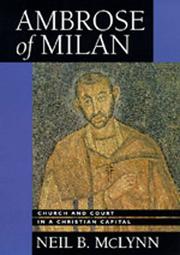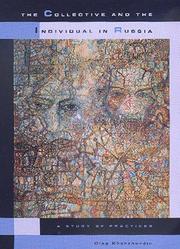| Listing 1 - 3 of 3 |
Sort by
|

ISBN: 0520914554 0585139784 9780520914551 9780585139784 0520084616 9780520084612 Year: 1994 Publisher: Berkeley
Abstract | Keywords | Export | Availability | Bookmark
 Loading...
Loading...Choose an application
- Reference Manager
- EndNote
- RefWorks (Direct export to RefWorks)
In this new and illuminating interpretation of Ambrose, bishop of Milan from 374 to 397, Neil McLynn thoroughly sifts the evidence surrounding this very difficult personality. The result is a richly detailed interpretation of Ambrose's actions and writings that penetrates the bishop's painstaking presentation of self. McLynn succeeds in revealing Ambrose's manipulation of events without making him too Machiavellian. Having synthesized the vast complex of scholarship available on the late fourth century, McLynn also presents an impressive study of the politics and history of the Christian church and the Roman Empire in that period.Admirably and logically organized, the book traces the chronology of Ambrose's public activity and reconstructs important events in the fourth century. McLynn's zesty, lucid prose gives the reader a clear understanding of the complexities of Ambrose's life and career and of late Roman government.
Church and state --- Church history --- Apostolic Church --- Christianity --- Church, Apostolic --- Early Christianity --- Early church --- Primitive and early church --- Primitive Christianity --- Fathers of the church --- Great Apostasy (Mormon doctrine) --- Christianity and state --- Separation of church and state --- State and church --- State, The --- Ambrose, --- Ambrogio, --- Ambroise, --- Ambrosio, --- Ambrosius Mediolanensis, --- Ambrosius, --- Ambrosius von Mailand, --- Amvrosīĭ, --- Aurelio Ambrogio, --- Aurelius Ambrosius, --- Rome --- History --- Ambrogio --- Ambroise --- Ambrose --- Ambrosio --- Ambrosius Mediolanensis --- Ambrosius --- Ambrosius von Mailand --- Amvrosīĭ --- Aurelio Ambrogio --- Aurelius Ambrosius --- ambrose. --- auxentius. --- bishop of milan. --- bishop. --- catholic church. --- christian church. --- christian pliny. --- church doctrine. --- church history. --- church leaders. --- church politics. --- constantius. --- council of 355. --- council of aquileia. --- de fide. --- de spiritu sancto. --- easter crisis 386. --- exegesis. --- gratian. --- martyrs. --- palladius. --- penance. --- religion. --- religious leaders. --- rhetoric. --- roman emperors. --- roman empire. --- roman government. --- saint ambrose. --- saints lives. --- saints. --- sanctification. --- satyrus. --- theodosius. --- valentinian ii. --- western christianity.

ISBN: 0520921801 0585200483 9780520921801 9780585200484 0520216040 9780520216044 Year: 1999 Publisher: Berkeley, Calif. University of California Press
Abstract | Keywords | Export | Availability | Bookmark
 Loading...
Loading...Choose an application
- Reference Manager
- EndNote
- RefWorks (Direct export to RefWorks)
Oleg Kharkhordin has constructed a compelling, subtle, and complex genealogy of the Soviet individual that is as much about Michel Foucault as it is about Russia. Examining the period from the Russian Revolution to the fall of Gorbachev, Kharkhordin demonstrates that Party rituals--which forced each Communist to reflect intensely and repeatedly on his or her "self," an entirely novel experience for many of them--had their antecedents in the Orthodox Christian practices of doing penance in the public gaze. Individualization in Soviet Russia occurred through the intensification of these public penitential practices rather than the private confessional practices that are characteristic of Western Christianity. He also finds that objectification of the individual in Russia relied on practices of mutual surveillance among peers, rather than on the hierarchical surveillance of subordinates by superiors that characterized the West. The implications of this book expand well beyond its brilliant analysis of the connection between Bolshevism and Eastern Orthodoxy to shed light on many questions about the nature of Russian society and culture.
Social psychology --- National characteristics, Russian. --- Social control --- Political culture --- National characteristics, Russian --- Social Conditions --- Sociology & Social History --- Social Sciences --- Culture --- Political science --- Social conflict --- Sociology --- Liberty --- Pressure groups --- Russian national characteristics --- Foucault, Michel, --- Fūkūh, Mīshīl, --- Foucault, Michael, --- Fuko, Mišel, --- Pʻukʻo, --- Pʻukʻo, Misyel, --- Phoukō, Misel, --- Fuke --- 福柯 --- Fuḳo, Mishel, --- Contributions in social sciences. --- Russians. --- Social sciences. --- Behavioral sciences --- Human sciences --- Sciences, Social --- Social science --- Social studies --- Civilization --- Ethnology --- Slavs, Eastern --- bolshevism. --- communist. --- eastern orthodoxy. --- fall of gorbachev. --- hierarchical surveillance. --- individualization. --- intensification. --- kharkhordin. --- michel foucault. --- novel experience. --- orthodox christian. --- party rituals. --- private confessional practices. --- public gaze. --- public penitential practices. --- russia. --- russian revolution. --- russian society. --- soviet individual. --- soviet russia. --- surveillance. --- western christianity.
Book

ISBN: 9781400861194 1400861195 0691631786 0691602255 Year: 2014 Publisher: Princeton, NJ
Abstract | Keywords | Export | Availability | Bookmark
 Loading...
Loading...Choose an application
- Reference Manager
- EndNote
- RefWorks (Direct export to RefWorks)
Covering Portugal and Castile in the West to the Latin Kingdom of Jerusalem in the East, this collection focuses on Muslim minorities living in Christian lands during the high Middle Ages, and examines to what extent notions of religious tolerance influenced Muslim-Christian relations. The authors call into question the applicability of modern ideas of toleration to medieval social relations, investigating the situation instead from the standpoint of human experience within the two religious cultures. Whereas this study offers no evidence of an evolution of coherent policy concerning treatment of minorities in these Christian domains, it does reveal how religious ideas and communitarian traditions worked together to blunt the harsh realities of the relations between victors and vanquished.The chapters in this volume include "The Mudejars of Castile and Portugal in the Twelfth and Thirteenth Centuries" by Joseph F. O'Callaghan, "Muslims in the Thirteenth-Century Realms of Aragon: Interactions and Reaction" by Robert I. Burns, S.J., "The End of Muslim Sicily" by David S. H. Abulafia, "The Subjected Muslims of the Frankish Levant" by Benjamin Z. Kedar, and "The Papacy and the Muslim Frontier" by James M. Powell.Originally published in 1990.The Princeton Legacy Library uses the latest print-on-demand technology to again make available previously out-of-print books from the distinguished backlist of Princeton University Press. These editions preserve the original texts of these important books while presenting them in durable paperback and hardcover editions. The goal of the Princeton Legacy Library is to vastly increase access to the rich scholarly heritage found in the thousands of books published by Princeton University Press since its founding in 1905.
Christianity and other religions --- Islam --- Muslims --- Mohammedans --- Moors (People) --- Moslems --- Muhammadans --- Musalmans --- Mussalmans --- Mussulmans --- Mussulmen --- Religious adherents --- Islam. --- Relations --- Christianity. --- History. --- Latin Orient. --- East, Latin --- Latin East --- Orient, Latin --- Islamic Empire --- Middle East --- Orient --- Latin Empire, 1204-1261 --- History --- 1st century. --- Abbasid Caliphate. --- Al-Andalus. --- Al-Maqrizi. --- Al-Mu'tamid. --- Alfonso VI. --- Alfonso X of Castile. --- Aljama. --- Almohad Caliphate. --- Amalric of Jerusalem. --- Arab culture. --- Arabic name. --- Arabic. --- Arabist. --- Battle of Muret. --- Bernard Crick. --- Caesarea. --- Caliphate of Córdoba. --- Canon law. --- Christian martyrs. --- Christian state. --- Church History (Eusebius). --- Conquest of Majorca. --- Constantine the Great. --- Continental Europe. --- Early Muslim conquests. --- Emirate of Granada. --- Eritrea. --- Fatimid Caliphate. --- Freeman (Colonial). --- Friar. --- Guido delle Colonne. --- Hanbali. --- Hebrew University of Jerusalem. --- Henricus. --- High Middle Ages. --- Hugh of Cluny. --- Iberian Peninsula. --- Ibn Arabi. --- Ibn Hud. --- Ibn Jubayr. --- Ibn Sab'in. --- International Institute of Islamic Thought. --- Islam and the West. --- Islam by country. --- Islam in Spain. --- Islamic culture. --- Islamic revival. --- Islamism. --- Judea (Roman province). --- Kingdom of Seville. --- Knights Hospitaller. --- Late Middle Ages. --- Latifundium. --- Latin Church. --- Latin Rule. --- Latin alphabet. --- Latins (Italic tribe). --- Lucera. --- Maarrat al-Nu'man. --- Modern Standard Arabic. --- Mongols. --- Moors. --- Mozarabs. --- Mudéjar. --- Muslim Brotherhood. --- Muslim world. --- Muslim. --- Muslims (nationality). --- Musulman. --- Names of God in Islam. --- New Latin. --- Oriental Orthodoxy. --- Peter the Venerable. --- Pope Boniface VIII. --- Pope Gelasius I. --- Pope Gregory IX. --- Pope Gregory VII. --- Pope Gregory VIII. --- Pope Paschal II. --- Pope Urban II. --- Pope. --- Primate (bishop). --- Principality of Antioch. --- Quran. --- Reconquista. --- Religion. --- Roman Rite. --- Sasanian Empire. --- Sicilia (Roman province). --- Sufism. --- Sunni Islam. --- Syria Palaestina. --- Templar of Tyre. --- Universal jurisdiction. --- Visigothic Code. --- Western Christianity. --- Westernization.
| Listing 1 - 3 of 3 |
Sort by
|

 Search
Search Feedback
Feedback About UniCat
About UniCat  Help
Help News
News